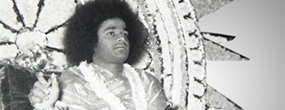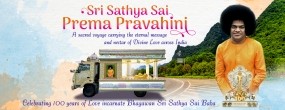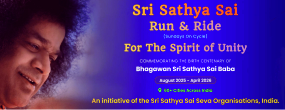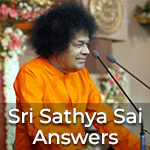DiscoursesWorld Conferences
[audio src="https://wpstatic.ssssoindia.org/wp-content/uploads/2022/04/16181210/B1.22-1995_11_20_6TH_WORLD_CONF_JAPANESE_TRANSLATION.mp3" /]

Discourse Date
20 November 1995

Place
Prasanthi Nilayam

Occasion

Discourse Collection
Sri Sathya Sai Speaks, Vol 28 (1995)
Divine EMBODIMENTS of love! All, over the world, mankind is racked today by various difficult problems. When one problem is solved, another-series crop up. The reason for this situation is the absence of right relationship between the individual and the society. At the very outset, we have to take note of four entities: The first is the power that can solve .any problem in a moment. This is Parameshti (the Supreme Self). The second entity is Shrishti (the created universe). The third is Samashti (the collective entity – society or community). The fourth is Vyakthi (the individual). These four are not separate entities. A body consists of different organs performing different functions but they are integral parts of one body. For instance, the hand has a palm, which has fingers. All are integrally related. Similarly, the primary role of Parameshti has to be recognized. It is only when Parameshti is understood that the secret of creation can be grasped. When this secret is understood, the significance of society will be evident. Then the individual‘s role can be understood. How to recognise Parameshti? By-developing sacred qualities and adoring the Parameshti (Supreme Self), the individual understands the secret of Shrishti (creation) and the importance of society. Today if you want to understand Prakrithi (Nature or the phenomenal Universe), you have to understand Samashti (Society). The term Samashti encompasses all social organizations. A Samashti (community) is made up of individuals coming together. This union of individuals is essential for realisation of the Divine.
Three Rules For Promoting Collective Action
Take, for instance, the present conference, Here people from different countries, professing different faiths and belonging to different cultures, have come together. But what is their common unifying factor? It is the belief in the Sai Principle that has, brought you together. All of them are trying to find unity in diversity. To promote unity, the concept of Samashti (collective action) has to be understood. There are three rules to be observed in promoting collective action, Sathyam bruuyath (Speak the truth). Priyam bruuyath (Speak what is pleasant). Na bruugath Sathyam apriyam (Never speak what is true but not pleasing). Truth is of the highest importance whether we consider morality, worldly life or spiritual progress. From the ethical point of view you have to speak the truth. In the context of worldly life, you have to speak what is pleasing. From the spiritual point of view you have to avoid what is not pleasing even if it is true. The Geetha also teaches that one should not utter words that cause excitement, but speak the truth, which is both pleasing and wholesome.
Three Faces Of Reality
There are similarly three concepts in Vedantha relating to what constitutes truth: Paramarthika, Vyavaharika and Prathibhasika. Paramarthika relates to the Supreme, Vyavaharika to worldly existence and Prathibhasika to the superimposition of the physical on the spiritual. These three are not at variance from each other. They are the same thing in three different forms like the ocean, the waves and the foam. The same coolness and taste that exist in the ocean are to be found in the wave and the foam. When you are considering matters relating to the world, you use the term vyavaharika. When you are considering experiences relating to the mind, you call them Paramarthika (concerning the Divine). When you consider matters relating to thoughts, you describe them as Prathibhasika. While the epithets are different, the underlying truth is one and the same. To know the nature of the Divine, the first step is to understand the social process. Starting with Parameshti (the Divine), you understand Srishti (creation) and become aware of Samashti (the society or community) and realise the role of Vyakthi (the individual). The process of understanding is an integral one related to each other. Without the individual there can be no society. Without society, creation has no meaning. Although different terms have been used in Vedantik parlance to describe the different levels of awareness, the entire understanding of this unifying process is that the individual proceeds from the social to the cosmic and then to the Divine.
The relationship between the individual and God should be properly understood. God is the Samashti (all-embracing whole). The individual has to experience his oneness with the universal. This universal has been called the Vishva-Virata-Svaruupam (Cosmic form of the Divine). All the beings you see here are manifestations of the cosmic form. This means that all are inherently Divine. By obsession with the separateness of the individual, one fails to see his cosmic essence. Forget the ego in you and recognise your spiritual essence. It is attachment to the body that is the cause of man’s loss of peace.
Man has explored everything in the external world but has failed to know his own true nature. As a result he has created Bhinnathvam (divisiveness). Once he knows his true self, he will have no feeling of divisiveness. He will recognise the oneness of all life.
Role Of Sai Sevaks
Why is this conference being held? In this context three things are highly significant. First, what should be the characteristics of persons in the Sai Organization? Their hearts should be cool like the moon. Their minds should be pure like butter. Their speech should be sweet like honey. It is only when you have a heart cool as the moon, a mind pure as butter and speech sweet as honey, will you be a worthy member of the organization. When these three qualities are present, there will be Divinity.
In the Geetha, Krishna advises Arjuna to give up all Dharmas and take refuge in Him. The Dharmas that are to be given up are related to the body and are the cause of innumerable worries. Sai love is the sure solvent for all these worries. (Bhagavan sang a Thelugu poem describing all the different worries from birth to death to which men are subject). As long as you do not understand the workings of Nature, everything will be worry. But once you understand them, you will be always happy. That understanding will lead you to the awareness of Parameshti (Divine). Once the nature of the Divine is understood, all experiences will be blissful like the sweetness, of sugar which is present in different kinds of sweets.
Vedantha And Science Proclaim The Same Truth
Recognise that the Divinity that is present in everyone is the same. This was the truth proclaimed by Vedantha. Scientists are now coming to the same view through a different approach. The ancient sages proclaimed the omnipresence of God, many millennia ago. ‘Ramadhas and Pothana also gave expression to this truth in their poems. Scientists are now declaring that the entire Cosmos is composed of energy. Some years ago, at a meeting in the Institute of Science, Bangalore, one scientist referred to” the ‘age of the sun, giving a figure running into billions of years. The ancients referred to the sun as anadhi, meaning that its origin is indeterminate. By merely assigning a definite number running into billions, has science-made the fact more meaningful than what the sages said? Anadhi. (Beginningless) is a truer description of the age of the sun, than the scientists reckoning in billions of years.
The ancients understood the secrets of creation by seeking to understand the Parameshti (Supreme creator). Through understanding creation, they realised the truth about society and the individual.
Self-enquiry is the means to Self-Realisation. Self-enquiry reveals that you are not the body, the senses or the mind. You are their master. You are the Atma (Spirit). The knowledge based on the body is Bhouthika Jnanam (worldly knowledge). The knowledge based on the mind is sujnanam (rational knowledge). The knowledge based on the heart is’ Atma Jnanam (Spiritual Knowledge).
We Are One Family
The most important concern of this conference should be how to enable members to realise the Parameshti (Divine). The first requisite for this purpose is good company. Good company is conducive to good thoughts. Anil Kumar referred to the “Latest God” in his speech preceding Bhagavan’s discourse. This is a misconception. There is only one God and He .is eternal. Dr. Safaya expressed thanks for the gift of blankets by devotees from Korea. Inspite of proximity to Svami over many years many have not understood Svami’s teachings even on minor matters. When do you express thanks? You thank a third person. But you don’t thank your own people. When you go out for a dinner you express thanks to the host, but does anyone thank the mother for serving food? There are no “others” in ‘the Sai Organization. We are one family. The ‘Word “thanks” should not be used in the Sai Organization. It is purely a conventional expression, in the ordinary world. The member of a family who works for the family is different from a worker who labours for wages. Members of the Sai Organization should render service without expectation of any reward or recognition. Members of the Sai Organization should endeavour to improve themselves to some extent at least as a result of their participation in this conference. Don’t bother about the past. Concentrate on the present. From now on, all of you should tread a sublime path. Don’t give room for mutual jealousy, hatred or ill-feeling. Follow the role’ “Help ever, Hurt never.” Discourse to the Sixth World Conference of Sri Sathya Sai Seva Organizations in the Sai
The fulfilment, of man’s life on earth consists in filling himself with the love of God and channelising, that love into acts of service, service of all who are embodiments of God. There is really no ‘other’ no ‘neighbour’. Everyone is oneself, for all belong to an indivisible whole. Service uplifts us, delights us, satiates our hunger, expands our horizons. Service to man is worship of God, in the one who gives and the one who gets, in the helper and the helped.
– Sri Sathya Sai Baba











































